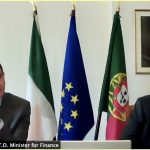The Resilience and Recovery Plan – building the foundations of the future competitiveness of the Portuguese economy
Portugal and the world are on the brink of the new ‘Roaring 20s’, a period of unprecedented growth fuelled by massive borrowing and digital acceleration and new, greener technology. In the fifth and final webinar in the Portugal Presidency Series of Webinars organised by AmCham Europe, an illustrious panel explain why a once in a lifetime €700Bn package to modernise Europe should not be spent in vain.
Both Europe and the US have embarked on the largest single public investment spending spree involving nearly €700Bn and US$3Tn of money borrowed on the International markets since Franklin D. Roosevelt’s New Deal in the 1930s.
The EU’s so-called €312Bn ‘bazooka’ has yet to be ratified by five Member States, but as Portugal’s minister of Finance João Leão expressed hopefully over the weekend – Portugal currently holds the EU’s six-month rotating presidency of the Council – that it will be by June.
Despite its size and the fragility of its economy which relies heavily on exports, real estate and tourism, Portugal faired remarkably well in 2020 given the grave consequences of most of the western world shutting down its economy for several months both this year and last.
Portugal’s minister for the Economy and Digital Transition, Pedro Siza Vieira addressing the webinar ‘Economic Recovery’ said Europe’s economic results were “most impressive” and “better than expected” by the early summer of 2020.
By the end of the year, Europe’s economies had felt less of a shock than had initially been assumed, while in Portugal the unemployment rate was a not so disastrous 6.5%, much less than anticipated.
The export of goods in the second half of 2020 actually increased in relation to the equivalent period in 2019, so GDP only fell by 2.76%.
“Just as the vaccination plan was being deployed in the western countries at the start of 2021, there was a further knock to a very fragile Portuguese economy with the second wave and a “very strict lockdown” by the middle of January,” said the minister.
Avoiding the worst
As a result, GDP fell in Q1 by 5.4% — the sharpest fall in the European Union. Portugal’s government reinstated furlough schemes, launched direct grants to companies, and as a result between January and April more cash transfers took place to help companies than in the whole of 2020.
“It seems that we have been able to avoid the worst. By the end of March we had one of the lowest incidence rates of Covid-19 in Europe, unemployment was at 6.8% and when the lockdown was eased demand immediately recovered, with improvement throughout April” said Vieira.
Industry and export of goods increased 6.2% in Q1 of 2021 like-for-like on 2020, with consumption and tourism “starting to get back to normal”.
The Portuguese government, he said, has decided to shift the focus of its economic policy from preserving jobs to helping create jobs; from supporting the supply side and firms, to stimulating demand, focusing on the most affected sectors — tourism, culture and some segments of retail.
The minister explained that Portugal will be supported in this by the Resilience and Recovery Plan (RRP) (€672Bn in all), with around €17Bn in grants and loans which Portugal will use to support public and private investment going forward.
“The money will be used to build the foundations of the future competitiveness of the Portuguese economy, including accelerating digital transformation, adapting society, economy and companies to a less carbon intense economy and reducing green house gas emissions by 60% by 2030,” said Siza Vieira.
And continued that the Portuguese government would support firms by continuing to invest in skills, innovation and export-oriented profits.
A new Roaring 20s
Pedro Siza Vieira believes Europe, the US and wider world are “on the verge of a new and prosperous era, probably a decade of very significant growth — the new ‘Roaring twenties’”.
That might be a rather over-enthusiastic belief and unfortunate term as history knows how the Roaring 20s in the last century ended by 1929 after a decade of massive borrowing, cheap loans, spiralling stocks and systemic bank problems very nearly brought the capitalist system to its knees. Sounds familiar?
This time, however, the minister assures that the stimulus plans both in the US and EU will be deployed at the same time, stimulating growth, investment and jobs. “The pace of adoption of these technologies by society and the economy will bring about very significant growth in productivity”.
“I think we have realised this year that we are better prepared as societies and economies to take full advantage of the potential of digital technologies which will result in great growth in productivity,” he said.
“There will be challenges in deploying smart infrastructure and new energy sources which will spur the creation of new and better jobs,” he added.
A fresh political agenda
Matched by a new political agenda, the attention of new political decision-makers will also take into account new realities with jobs becoming the focus of monetary policy. Monetary policy would, however, continue to be accommodating and support growth in the coming years.
Fiscal policy, says the minister, is now being used to tackle issues around recovery and expediting productivity. Tax competition and low-cost competition will no longer be the name of the game across the western world.
“We have seen political signals from the (Biden) administration bring about a consensus within the OECD countries on international taxation”, he said referring to the adoption in the EU of the Council Directive on ‘Administrative Cooperation in the Field of Taxation’ (also known as DAC 7) that will extend the scope of the existing provisions on exchanges of information and administrative cooperation between the Member States by requiring digital platforms to collect and report information on the income realised by sellers offering certain services. The rules will apply as from 1 January 2023.
“It means we are focusing on levelling the playing field in respect of tax policy as political communities in the West aim to preserve the capitalist system and democracy in a cohesive model that invests in skills and innovation in a climate-friendly economy and makes the most of these technologies,” said the minister.
“If we focus on the fundamentals and the scale of the opportunities we have, and work decidedly to take full advantage of what science and technology we have at our disposal, we will be facing a decade which promises to be remembered in the future as an era of shared prosperity”.
Cristina Falcone, VP, Public Affairs, Europe – UPS believes that the EU’s economic recovery plan puts the “right emphasis on the single market, green and digital economies” as critical engines for the recovery.
“We at AmCham Europe (American Chamber of Commerce Europe) believe that a competitive single market is fundamental while the EU also needs an industrial policy that can rise to the current challenges which can be achieved through digital and green transition, but it must be open-looking towards foreign direct investment and trade,” she said.
Greener, digital and inclusive
Reka Horvath, Deputy Head of Unit, European Commission expressed the need to “make the most of this crisis to invest in recovery” and in “using the EU funds for something better and recover in a better way”. This meant being greener, digital and more inclusive in terms of equal opportunities for all in which stakeholders had a say on what the ‘bazooka’ money would be spent on.
“We want a social and more inclusive recovery. Not everyone was impacted the same way by this crisis, women lost out more than men, for example, and children from disadvantaged backgrounds suffered much more than those from more fortunate families. Recovery should include policies for the next generation meaning children and young adults,” she said.
Bernardo Correia, President of Google Portugal referred to the pandemic crisis as a “once in a lifetime situation” in which digital technology has been a lifeline. “I don’t think we could have got through this without digital videoconferencing tools”.
“I think we are seeing an acceleration of everything, but automaton will not spell the end of jobs. Contrary to popular belief, Europe will need an additional 6 million workers by 2030, while data suggests 90 million Europeans will develop new digital skills just to stay in their current jobs,” he said.
In Portugal, he pointed out that only 27% of the population have advanced digital skills and 50% have basic digital skills. “This is unsustainable and we must change it,” he said adding that the pandemic was accelerating and widening existing divides. “If we attend to this now, we will reap the benefits of this later”.
Access to a free and open web had never been more important — for people, businesses, economies and societies. “Without these digital tools we would not have seen the kind of resilience to offset the economic impacts that governments were able to have,” said the Google Portugal boss.
“We have seen a disproportionate impact on small businesses, (some) women, ethnic and lower income groups while some European countries have been more impacted by the lack of tourists,” he said.
Correia says European economies need to re-skill massively with the right tools, the right skills and the right investment, but also rules to make sure all of this worked together.
“In Portugal we are doing our part, and since 2016 we have trained 100,000 people in additional skills through digital programmes” he said using by example Google Portugal’s launch of a partnership with the Ministry of Labour offering 3,000 grants for online digital training in IT. “If you’ve got your doors closed the best thing you can do right now is to invest in people and their skills.”
Open road, highway code
Correia says there needs to be some rules and regulations. The internet, he said, was like giving everyone cars and roads but not giving them a manual or the highway code. “We need some new rules and responsible regulations.”
Correia also said that Google Portugal had signed a Memorandum of Understanding with the government aimed a economic recovery and accelerating digital transition in which digital skills and employability are the main areas foreseen in the document, but admitted there are some “underlying tensions that need to be addressed now.”
Cristina Falcone highlighted the “skewed impact” of the pandemic on different sectors of the economy, such as tourism, and certain sections of society, including women.
“We are seeing first hand that e-commerce has been a lifeline for communities when people were in their homes because of quarantine, but also to enable small businesses to participate in e-commerce which we hope to see grow in future, particularly among women. Once people have had a taste of e-commerce they are not going back.”
Social spending
Focusing on the Recovery and Resilience plan, Reka Horvath pointed out that every member state has to spend at least 37% on green and 30% on digital transition but there has been little or no mention of social spending.
The reason for this is that there has already been a considerable focus on gender equality and social and minority issues, health and education for the European semester, while the digital and green component linked to the bazooka is new, so we hear more about it. Also, funds could be allocated according to a two-pronged ‘carrot and stick’ approach by providing them to SMEs that pursue equal opportunities and equality and can give proof that that they do this.
Restoring pre-pandemic trade links
There is still a need, says Cristina Falcone, to “reduce some administrative burdens and paperwork” to create seamless processes in the commerce and value chains, whether in the EU itself, or when looking to enhance opportunities for trade at a transatlantic level and while there is no TTIP (Transatlantic Trade and Investment Partnership), there are measures on customs regulations that could be introduced that would bring “really tangible benefits” for European SMEs.
Falcone also stressed that going green also meant adopting a greener transport policy by shifting the emphasis away from road-dominated haulage operations toward a fast and efficient high-speed railway network.
“It’s not just about restoring and bouncing back, it’s about rebuilding the future and building better. Moving some cargo from ships to rail, connecting airports. There is definitely an opportunity to go more green, be more agile and build a transportation service that is fit for the future.
Governments taking the lead
Google’s Bernardo Correia says the public sector needs to lead by example and it is here that Portugal stands out for its public sector services. “You can pay your taxes online and the sophistication of the digitalisation of the public service sector in Portugal is quite advanced,” he said.
But technology is changing a lot faster than governments and even private companies can keep up with, particularly the shift towards Artificial Intelligence and Cloud computing. Governments and companies need to make the most of these technologies by using AI, for example, to predict forest fires — a problem in both the US and Portugal.
“The special use of technology, especially cutting-edge technology like AI, needs to be led by the public sector and it has taken Portugal to new levels in our relationship with the scientific community,” he said, pointing out that one of Portugal’s biggest reservoirs of knowledge was its scientific community. “Few people outside of Portugal know this, but it is one of our best exports but we also need to know how to attract talent and keep it here in Portugal.”
Last, the importance of using the EU recovery funds to support the travel sector and in addressing imbalances in terms of inequalities and salaries was vital. “At Google we have a role to play. We will continue to invest strongly in skills in Europe. We think this is the most single important investment that needs to happen in Europe.”
Text: Chris Graeme










